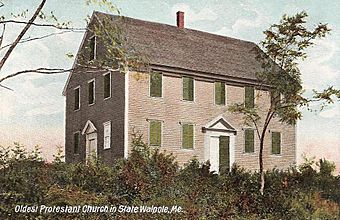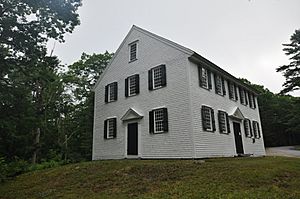Walpole Meetinghouse facts for kids
Quick facts for kids |
|
|
Walpole Meetinghouse
|
|

A postcard from around 1908 showing the Walpole Meetinghouse.
|
|
| Location | Walpole Meeting House Rd., Walpole, Maine |
|---|---|
| Area | 1 acre (0.40 ha) |
| Built | 1772 |
| NRHP reference No. | 76000104 |
| Added to NRHP | November 07, 1976 |
The Walpole Meetinghouse is a historic church in the Walpole area of South Bristol, Maine. Built in 1772, it is one of the oldest churches in Maine that is still in use. Because it has been so well taken care of, it looks much like it did when it was first built during America's colonial period.
The building is so important to American history that it was added to the National Register of Historic Places in 1976. Today, a non-profit group looks after the meetinghouse. It is sometimes used for church services in the summer.
Contents
A Look at the Building's Design
The Walpole Meetinghouse is a simple but beautiful two-story wooden building. It stands on Walpole Meeting House Road, near Maine State Route 129.
Exterior Features
The outside of the meetinghouse is covered with its original wooden shingles, which are held in place with nails that were made by hand. The building has three entrances. The main entrance is on the long south side of the building. It has a double door decorated with columns and a triangular piece on top called a pediment.
Inside the Meetinghouse
When you step inside, you enter one large room. The ground floor has many box pews, which are like small rooms with benches where families would sit together.
At the front of the room, on the north wall, is the pulpit. This is a raised platform where the minister would speak. Behind the pulpit is a large wooden board called a soundboard, which helped project the speaker's voice. The columns holding up the soundboard are painted to look like marble. In the front corners of the room, stairs lead up to a gallery, or balcony.
History of the Meetinghouse
The meetinghouse was built in 1772 for a group of Scottish immigrants. At first, they were part of the Presbyterian church. However, the main church leaders were in Boston, which was far away. Over time, the church members became Congregationalists.
In the late 1800s, the church was repaired. Workers discovered that the original wooden shingles on the outside were still in great shape, so they decided not to replace them. This is one reason why the building is such a special link to the past.
See also
 | Anna J. Cooper |
 | Mary McLeod Bethune |
 | Lillie Mae Bradford |




